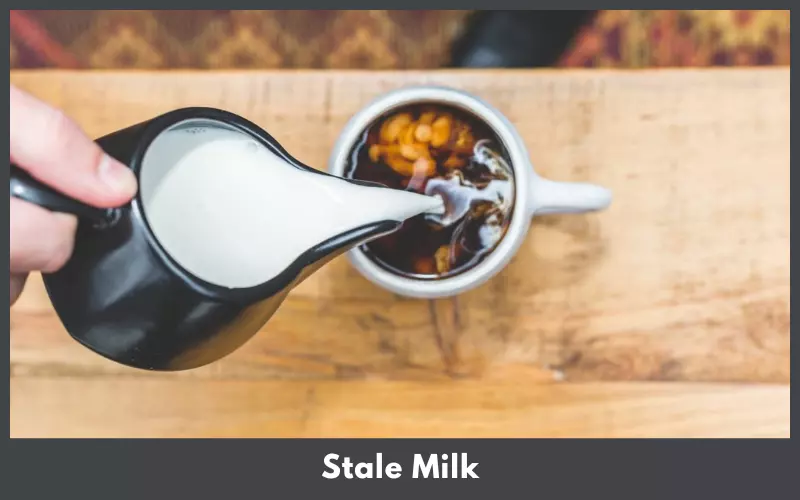You add milk with coffee to drink a cup of perfect milk coffee and see that the milk has started curdling, it’s really annoying. Even the taste doesn’t exactly satisfy the mind. But, why does milk curdle in coffee? Especially, to me, milk curdling in coffee ruins my mood. I don’t like when the protein lumps remain separated floating on top of liquids. Henceforth. I never want a cup of coffee to go to waste like this.
So, I tried many tips and tricks to avoid this situation. Hopefully, I became able to find several factors that actually play a role in this curdling process. I think the information will help you if you get disappointed too when milk curdles after adding. Let’s know more details about milk coffee.
Contents
Why Does Milk Curdle in Coffee?
Basically, proteins clump together in milk during pH levels start to fall and acidity increases. All the process is called curdling. Milk curd is famous and nutritious to many. But, in coffee or tea, we usually want to avoid it. There are many reasons for milk curdling. So, the reasons I got to know are described here.
1. Stale Milk
Adding expired or stale milk with hot espresso will definitely cause the milk to curdle. That’s why before adding milk to coffee, you must check its lifetime on the packet.

Moreover, curdling also occurs due to the use of older milk even if it is not expired. Milk that is not fresh reacts with the coffee acid easily as it’s more acidic than fresh milk. Later, milk turns into curd.
2. Unpasteurized Milk
Many of us use raw or unpasteurized milk in coffee. I’ll say you shouldn’t do this as there is the risk of curdling. Because the bacteria which play a role in curding exist more than in pasteurized milk.
3. Coffee with too Much Acid
Milk often curdles when it comes to contact with an acidic liquid. If the milk repeatedly curdles even after it’s fine, you should check if the coffee you are using is too acidic.

4. Uneven Temperature
Then, curdling also occurs when coffee temperature and milk temperature vary too much. I have seen many times adding cold refrigerated milk with hot coffee causes curdling.
5. Uncleaned Coffee Machine or Mug
Sometimes milk and coffee are fine but milk curdles. This is due to an unclean coffee machine or the pot you use to prepare. If the espresso machine is not cleaned regularly, the bacteria inside it occurs curdling the milk. Moreover, if acidic liquid i.e. lemon juice or vinegar is put in the container and later coffee is made without proper cleaning, curdling occurs.

How To Stop Milk From Curdling in Coffee?
Although curdled milk in coffee may not bother you, you definitely don’t want to offer your guests or someone special a cup of coffee that turns curdled after adding milk. If the milk curdles repeatedly, don’t be frustrated. Hopefully, it’s possible to get rid of it by adopting some methods. My acquired tips and tricks are here and by following them you can solve the problem.

- Add fresh milk: Fresh milk is relatively low in lactic acid. That’s why, it has less tendency to curdle. So, choose fresh milk in preparation for milk coffee.
- Avoid unpasteurized milk: Milk curdles even if you use fresh milk but unpasteurized. Nevertheless, if you want to add this milk, boil it properly.
- Reduce the acidic level of your coffee: Depending on the region of coffee cultivation and roasting, its acidity differs. For example, Arabica coffee beans and darker roasted coffee beans are low-acidic. Moreover, curdling also occurs if you don’t mix adequate water. So, mix sufficient water while preparing coffee.
- Maintain heat balance: Never mix cold milk with hot coffee or hot milk with cold coffee. You can add milk at room temperature when the heat intensity of the coffee will decrease a little.
- Don’t put anything acidic in the coffee pot: The pot you usually use to prepare milk coffee should be separated. Especially, it should be away from keeping anything acidic.
- Clean your coffee maker: Even after following all the above techniques, if you see that milk curdles, you’re not cleaning your coffee maker properly. So, clean it regularly.
Can You Drink Curdled Milk in Coffee?
Whether you can drink curdled milk in coffee or not depends entirely on the milk added. First, make sure that the milk is not expired. Expired milk is not drinkable as harmful Bacterias grow there which can cause serious conditions like food poisoning.

On the other hand, if you are absolutely sure that the milk was not expired i.e. it’s fresh or a little old then you can drink the milk coffee without health concerns. Generally, if the milk is okay, it doesn’t emit any different smell as well as any awful taste. So, it may look spectacular but it’s perfectly drinkable.
How to Stop Soya Milk Curdling in Coffee?
When using soya milk to prepare milk coffee, there are two things to be careful about. One is the temperature and the other is the acidity of the coffee. Generally, soya milk curdles for temperature and coffee’s acidity. Many times it’s seen that curdling occurs even when milk is added to cold coffee. This is mainly because the acidity level of the coffee is high.

Tips You Can Follow to Get Rid of Such Situations:
Never mix soya milk in hot coffee. If you want to mix it with hot coffee, you have to pour hot coffee little by little into the milk and mix it quickly. Also, always try to choose coffee beans with less acid.
I hope that if you take care of these two things, soy milk will not be curdling.
Why Does Almond Milk Curdle in Coffee & How to Stop?
Many people love nut milk instead of dairy milk. However, making a cup of milk coffee with almond milk is more complicated due to its thinness. Generally, almond milk has lower protein levels than dairy milk. As a result, it curdles easily at high temperatures. Almond milk curdles when directly heated or mixed with hot coffee. Another big reason for this milk curdling is the high acidity in the coffee.
How to prevent:
Here are some tricks that can help you get your favorite cup of coffee made with almond milk-
- Choose almond milk that contains high protein content.
- The milk should be heated slowly at a low temperature.
- Never mix cold almond milk with hot coffee.
- While mixing, don’t rush, rather take time to mix the coffee gradually in small amounts and stir it to dissolve.
FAQs:
Does Oat Milk Curdle in Coffee?
Yes, oat milk certainly curdles if you mix it with too hot coffee. While using any type of vegan milk including oat milk, keep the coffee at a tolerable temperature.
How do You Stop Soya Milk Curdling in Coffee?
All plant milk goes bad by adding them to hot coffee. Therefore, there’s another tip you can follow. You can use a small amount of baking soda (not more than a pinch). Baking soda buffers black coffee. So, soy milk doesn’t curdle.
Is Curdled Milk the Same as Spoiled Milk?
Actually, curdled milk is the primary stage of spoiled milk. Although curdled isn’t a waste. When milk curdles, proteins get separated from the water. So, it’s okay to consume curdled milk. On the other hand, as time increases, bacteria attack the protein and milk turns rotten. The common signs of spoiled milk are bad odor as well as taste.
Conclusion
In fact, I have tried to discuss here almost all the possible causes of milk curdling in coffee based on my known facts. Hopefully, following the mentioned solutions, you won’t be annoyed to make a nice cup of milk coffee the next time. No matter what types of milk such as dairy or vegan you add to your coffee, it can give you a creamy, delicious texture instead of turning into curdle. So, enjoy your coffee time

